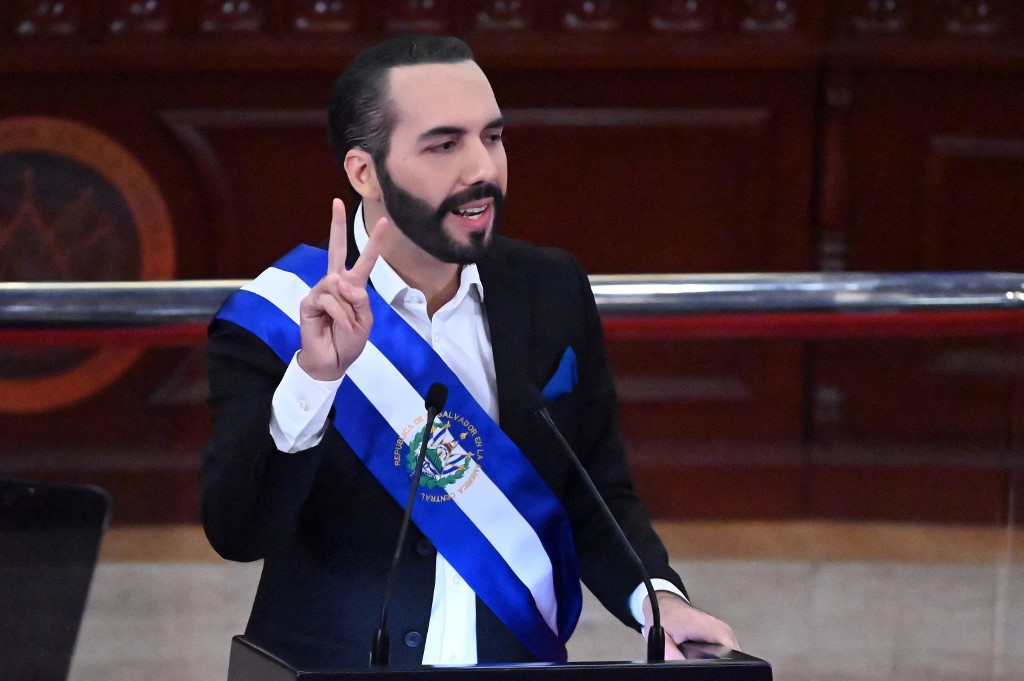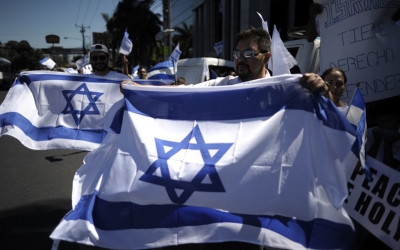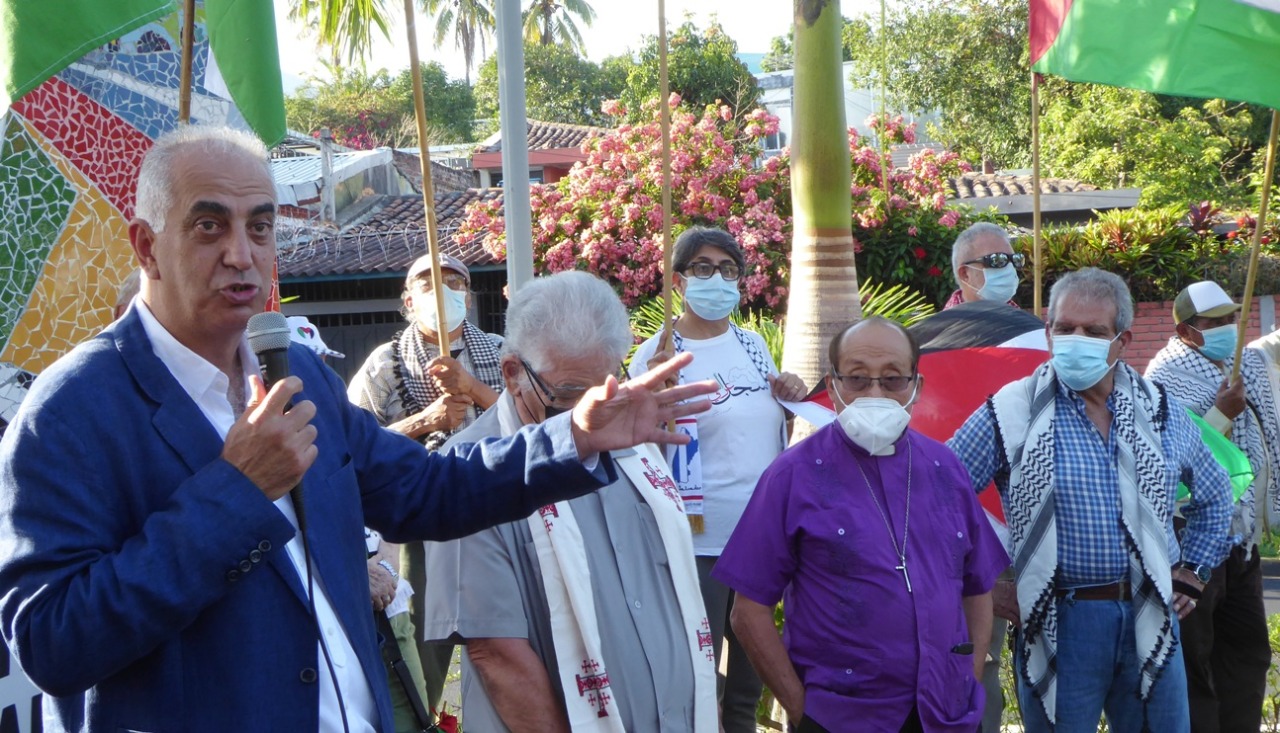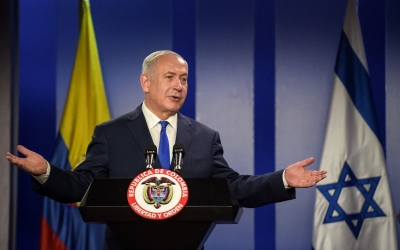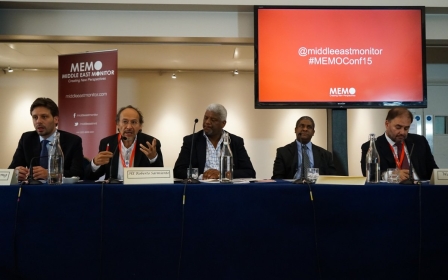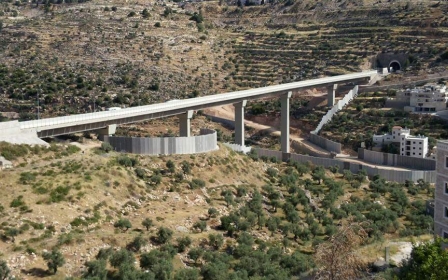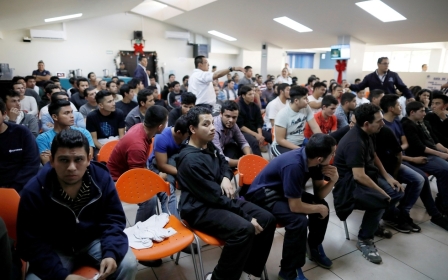El Salvador: A pro-Israel president of Palestinian descent deepens divide among diaspora
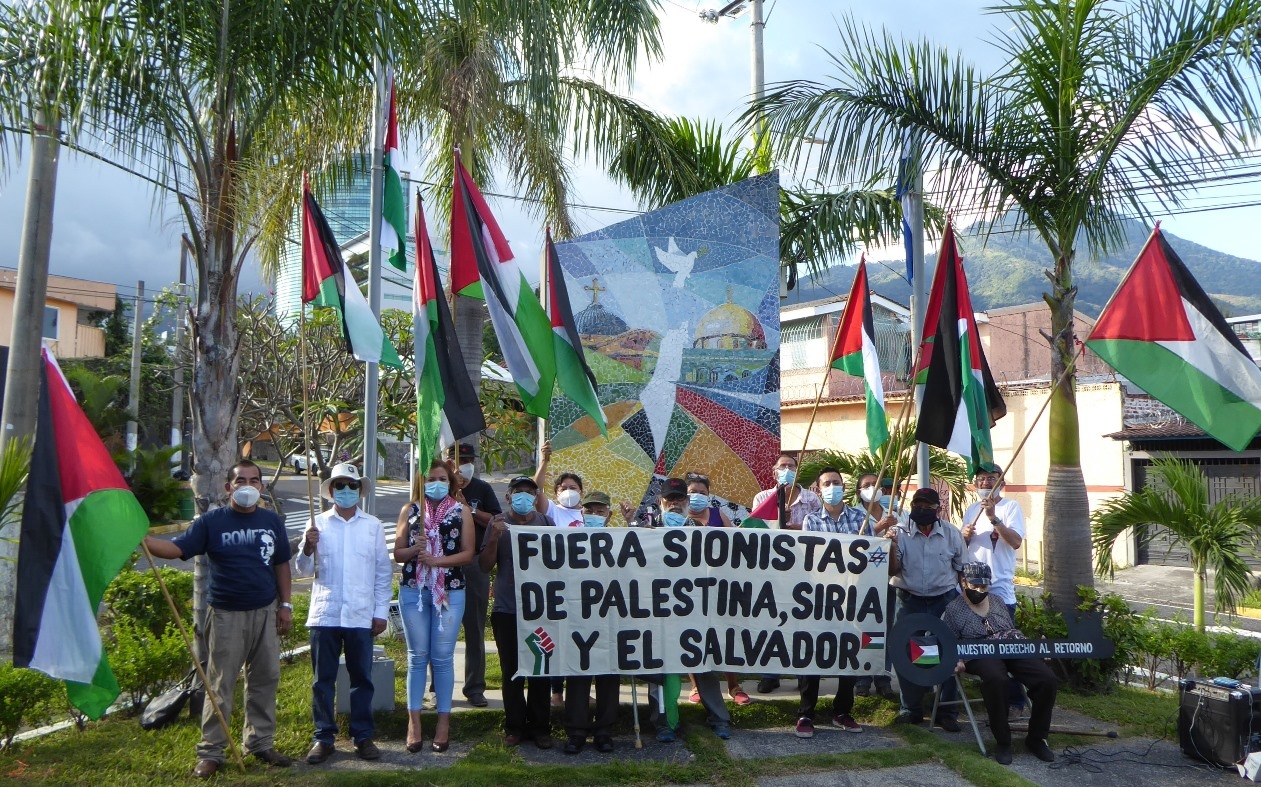
In El Salvador, the recent deadly Israeli offensive on Gaza has exposed the divisions between the Palestinian community and the political leadership of the Central American country.
The Palestinian diaspora of some 100,000 who live in El Salvador has found itself torn between the contradictions of a pro-Israeli president of Palestinian origin and their wish to express solidarity with their homeland in its struggle against Israeli occupation.
'Given his roots, Bukele can go further and not just defend our people but also denounce Israeli crimes'
- Simaan Khoury, Palestinian Union of Latin America
The 39-year-old populist president of El Salvador, Nayib Bukele, hails from a Palestinian family. His grandparents were Palestinian Christians who emigrated to El Salvador from Bethlehem and Jerusalem in the early 20th century. His father Armando Bukele Kattan converted to Islam and became a prominent imam in San Salvador and vocal defender of the Palestinian cause.
Despite his family's links to the region, Bukele has yet to make any public comments on the recent hostilities between Israel and Gaza that left 248 Palestinians dead, including 66 children, and killed 13 Israelis, including two children.
For the Palestinian community, however, Bukele's silence came as no surprise.
New MEE newsletter: Jerusalem Dispatch
Sign up to get the latest insights and analysis on Israel-Palestine, alongside Turkey Unpacked and other MEE newsletters
Simaan Khoury, head of the Palestinian Union of Latin America, said they did not expect a reaction from the president, who was previously mayor of the capital city, San Salvador.
“As a community, we hope to hear a pronouncement on the issue soon," he told Middle East Eye. "Given his roots, Bukele can go further and not just defend our people but also denounce Israeli crimes.”
'A friend of Israel'
Upon his election as president in 2019, Bukele was referred to as “a friend of Israel” by the Israeli press. He was also described as a “partner for cooperation” by the Israeli ambassador to El Salvador in 2015.
Shortly after taking office, Bukele struck a multi-million dollar medical deal with the Israeli nonprofit Jerusalem Foundation which saw El Salvador receive $3m for its military and police forces.
Nonetheless, the Palestinian ambassador Marwan Jebril Burini is content with the relationship his country enjoys with El Salvador, though he is dismissive of Bukele’s roots and the diplomatic difference they could make.
"The fact that the current president is of Palestinian origin is neither an advantage nor a disadvantage for the relationship with Palestine,” Burini told Middle East Eye. “Our relationship is respectful."
In 2018, Bukele, at the time mayor of San Salvador, visited Israel on an Israeli government-sponsored trip during which he met the mayors of Tel Aviv and Jerusalem and prayed on the Buraq Wall.
“That visit was not well received by the Palestinian community in El Salvador,” says Burini. “He considered that going to Israel at that time could benefit El Salvador, but there has been no benefit. Israel was trying to take advantage of its relationship in Central America and the needs of these countries for ultimately political achievements.”
The move was perceived as a reflection of the contradictions of a man who a year earlier received the mayor of Bethlehem Vera Baboun and declared that “the connection to Bethlehem cannot be measured with money nor political power, but with feelings and love.”
President Bukele has remained publicly distanced from the Palestinian struggle, making his stance on the Israeli-Palestinian issue hard to gauge. In a 2019 interview with AJ+, he made a rare comment on his views for Palestine, skirting many of the complexities that surround the topic.
“I’m very proud of my Palestinian origins, I would like to see a thriving Palestinian state. If you have a state, that state will thrive. Technology is more important than land, the Palestinians can have a state - yes, it’s smaller than the one in 1948, yes, it’s smaller than the one in the Oslo Agreements. Fine, let’s demonstrate that we can have a thriving state, peaceful and open for business,” he told the online Qatari-owned platform.
The Salvadoran president is generally not seen as a partisan figure - highlighted by his ambiguous religious stance - and is cautious of any collateral damage a firm stance on the issue may have, analysts have argued.
According to Amy Fallas, a Salvadoran academic at UC Santa Barbara who focuses on the Middle East and Latin America, Bukele's lack of reaction to the latest Gaza-Israel war reflected his inward-looking approach.
“His political priorities in the country are outweighing his allegiance to the Palestinian cause. He can say ‘I'm proud of being Palestinian’ but in terms of the Palestinian cause, of resisting occupation or an equitable solution, he's looking at Palestine’s way forward through business and technology, not through sovereignty, self determination or an eradication of these historic wrongs,” she said.
“He basically said: ‘it doesn't matter if we go back to 1948, the land doesn't matter’. That's exactly the opposite of what Palestinian activists have said, so he's trying to minimise that or not address it, thinking about other ways of [Palestine] flourishing, which don't get to the core issues of what Palestinians are asking for,” she told MEE.
When it comes to Israel and Palestine, San Salvador city is no less contradictory that the country's president.
'[Bukele's] political priorities in the country are outweighing his allegiance to the Palestinian cause'
- Amy Fallas, UC Santa Barbara
The city houses the Palestinian embassy, a Salvadoran-Arab Club, a housing complex named Villa Palestina - which features streets named after Palestinian cities - as well as Palestine Square and Yasser Arafat Square.
Israel Square is only a two-minute walk from Palestine Square, and is not the only bit of infrastructure dedicated to Israel. In San Salvador one can also find the Nueva Israel - "New Israel" - housing complex, while the eastern city of San Miguel has a State of Israel Square as well as Menachem Begin Avenue, named after the former Israeli prime minister who ordered the 1982 invasion of Lebanon that resulted in the death of approximately 20,000 Lebanese and Palestinians.
Strong bonds
For Khoury, the president of the Palestinian Union in Latin America, the community is well integrated in their new homeland, yet still maintains strong connection to Palestine. "There are still strong spiritual bonds and love for the motherland," he told MEE.
Those bonds were reinforced and put on show last month in the Salvadoran capital of San Salvador, when Khoury and fellow Palestinians took to the streets to protest Israel’s latest attacks on Gaza and occupied territories.
Watching the attacks unfold from afar, over 12,000km from their motherland, is not a new occurrence for the Palestinians in El Salvador, but highlights the relevance and strength that the diaspora holds in the Central American state.
Modern-day El Salvador cannot be explained without the prominent Palestinian and Arabic surnames scattered throughout the country’s recent history: the Safies, Nassers, Zablahs, Handals, Bahaias, Simans, Hasbuns, Sacas, Bukeles and others that contributed to shaping El Salvador.
The community established itself in El Salvador following the collapse of the Ottoman Empire in the early 1900s and over the decades they slowly established themselves as reputable traders and consolidated themselves among the country’s economic and political elite.
Even before the election of Bukele, the 2004 presidential election was contested by two candidates of Palestinian origin, Antonio Saca and Schafik Handal - the former emerged victorious.
Likewise, proximity with Israel is by no means a new development in El Salvador as the two countries shared close military ties during the 1970s and 80s during the years of brutal civil conflict and US military intervention.
According to the Stockholm International Peace Research Institute, 83 per cent of El Salvador's military imports between 1975 and 1979 came from Israel, with the Salvadoran secret police also receiving training from Israeli forces. In 1981, El Salvador received $21m in arms credits from Israel upon the United States’ request.
For the Salvadoran president, that is a political agenda worth pursuing. Bukele is a politician at heart and not one to let his Palestinian origins trump his political instinct.
“For Bukele, Palestine is just a distant memory. He's part of a political system which wants to be in line with the far-right, have good ties with Israel, improve the relationship with other right-wing governments in Latin America and have good ties with the US," says Yousef Aljamal, an academic and co-author of Palestinian Diaspora Communities in Latin America and Palestinian Statehood.
“It's about politics and the position of a political class in El Salvador that is benefiting from having good ties with Israel and the US. Many people would expect that he would be in line with his roots, but I think he's an exception to the rule.
"He’s acting as an individual and he's not influenced by the Palestinian community at all, whether he has Palestinian roots or not doesn't matter,” Aljamal told MEE.
During the Trump administration, Bukele seemed particularly interested in befriending the US president and building strong political ties. The pair met in September 2019 and Bukele said the former president was “very nice and cool”, despite Trump calling El Salvador a “shithole country” a year earlier.
Hope for change
Given El Salvador’s increasing closeness to Israel and the growing political influence the latter is gaining in neighbouring Guatemala and Honduras, it would not be overly surprising to see Bukele usher in a new era of friendship between the two countries.
However, following the recent Israeli attacks on Palestine the time may not be ripe for a renewed friendship. Bukele, a man obsessed with his approval ratings, social media and public perception, must now tread carefully and will be wary not to tarnish his public persona.
'With the changes taking place in Palestine the country’s Palestinian community would really be angry at him if he takes any step further towards Israel'
- Yousef Aljamal, academic and author
“With the changes taking place in Palestine, the country’s Palestinian community would really be angry at him if he takes any step further towards Israel,” Aljamal says.
“With Trump no longer in office, the recent situation with Palestine and the global solidarity received, I don't think that he would dare to further strengthen his ties with Israel. He would have to think twice about the reaction that he would get, and I think this is not the best time for him.”
Similarly, Khoury is hopeful that Bukele’s ancestral homeland will carry enough weight to deter him from hindering the country’s Palestinian diaspora.
“I’m a Salvadoran citizen so I support my government and I support my country. However, my feelings towards Palestine are different, I’m an activist and a defender of our cause. I’m sure Bukele was raised to defend Palestine and I’m sure his blood is thicker than water,” Khoury tells MEE.
Middle East Eye delivers independent and unrivalled coverage and analysis of the Middle East, North Africa and beyond. To learn more about republishing this content and the associated fees, please fill out this form. More about MEE can be found here.


